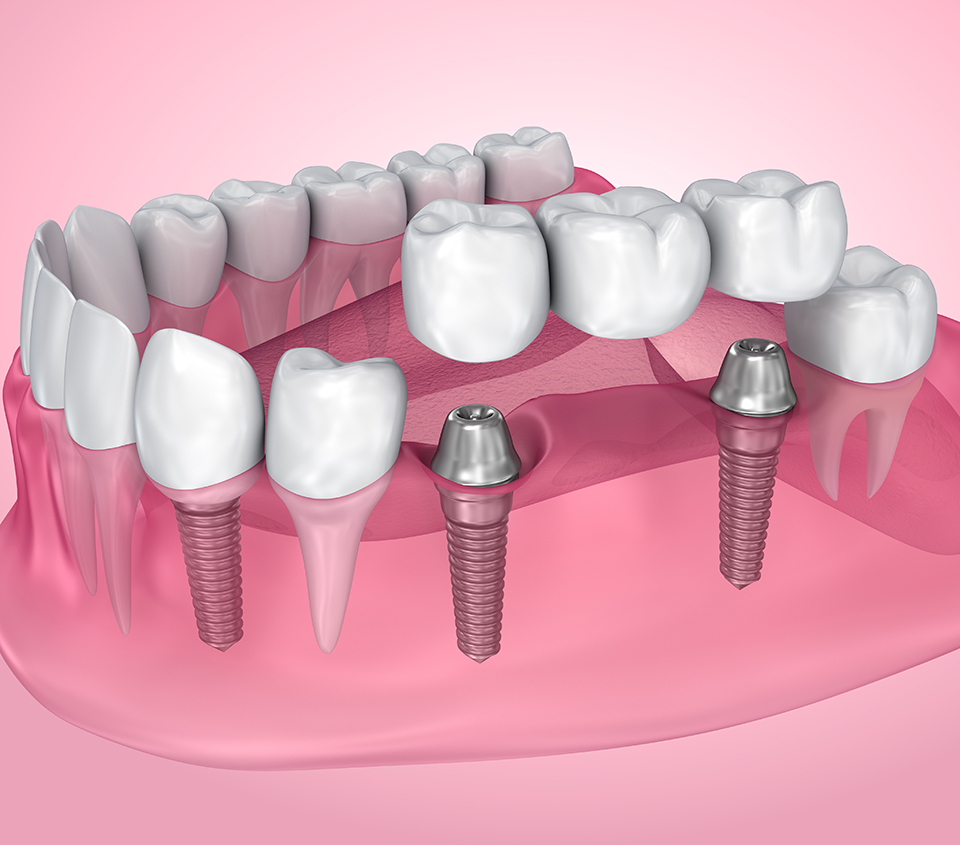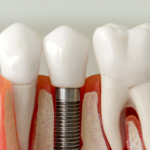Natural dental tooth bridge
30 minute consultation
Dental bridges that look, feel and function like natural teeth.
Or call: +65 6734 9393

Natural Dental Tooth Bridge
A dental tooth bridge, which is also known as fixed partial denture, is used to replace one or more missing teeth. It is attached to the adjacent natural teeth or dental implants. A dental tooth bridge is attached to the natural teeth surrounding the problematic area. Bridges are like artificial teeth that can improve your appearance and help you smile with confidence.

What is a dental bridge?
A dental bridge is a dental restoration option to replace teeth. They are usually made of porcelain and are fused with metal or ceramics to give a more natural colour.
The restoration ‘bridges’ across an area with missing teeth and is held in place by one’s own natural teeth or dental implants. It distributes the bite forces and helps you chew with more ease and prevent other teeth from moving out of place and affecting your dental health.
Types of dental bridges offered at Specialist Dental Group
At Specialist Dental Group, we offer a variety of dental bridges to suit the different needs of our patients. Our prosthodontists determine the best type of bridge for each case. Here are the dental bridge options available to our patients:
Traditional dental bridges
Traditional bridges are the most common type of dental bridges. They consist of one or more pontics (artificial teeth) and are held in place by dental crowns. These crowns are cemented onto the teeth adjacent to your missing tooth.
Cantilever bridges
Unlike traditional bridges, cantilever bridges are supported by a dental crown on only one side rather than both sides of the missing tooth. This type of bridge is used when there are healthy teeth on one side of the gap.
Maryland bridges
Maryland bridges are considered a conservative alternative to traditional bridges. These bridges consist of a pontic held in place by a metal or porcelain framework. This framework is bonded onto the backs of the two adjacent teeth.
Implant-supported bridges
For patients looking for the most stable and durable solution, implant-supported bridges are an excellent option. Instead of being supported by crowns or frameworks, these bridges are supported by dental implants. One implant is placed for every missing tooth, and these implants hold the bridge in place.
Each type of bridge has its own advantages and applications, and our specialists will guide you through the decision process to choose the most suitable type based on your dental health, the location of the missing tooth, and your personal preferences.
What is involved in a dental tooth bridge procedure?
Our dental specialist/ dentist will find out the details of your medical and dental history, go through a consultation and examination and take a digital X-ray of your teeth to enable a thorough and detailed diagnosis, to ascertain if a dental bridge is suitable for you.
We need to ensure that the teeth next to the missing teeth are in good health. Sometimes, root canal treatment may be recommended when there is extensive dental decay.
Approximately 1 mm of tooth structure will be removed from the supporting teeth and a mould of the teeth will then be made. The mould will be sent to the dental laboratory to fabricate the bridge. In the meantime, a temporary bridge will be cemented to the adjacent teeth to protect the supporting teeth.
How should I care for my temporary teeth?
Temporary teeth, whether they are dental bridges or crowns, are not meant to be permanent. They also serve as a blueprint for the development of the final teeth, allowing adjustments to be made until the shape is correct. Here are several precautions to take note of when you have temporary teeth:
- Avoid sticky, chewy foods (for example, chewing gum, toffee, etc.), which could dislodge the bridges.
- Minimise the use of the side of your mouth with the temporary teeth. Try to chew more on the other side of your mouth.
- Avoid chewing hard foods (such as nuts, raw vegetables, apples, etc.), which could dislodge and/or break the temporary teeth.
Once the permanent bridge is ready, the temporary bridge will be removed and the permanent bridge will be cemented onto the teeth.
Once completed, your new teeth will look, feel and function just like your natural teeth. They require the same maintenance as your natural teeth – flossing, brushing and regular dental check-ups and maintenance every 6 months. They way, you can prevent plaque from building up between the bridge and the supporting tooth. With proper care and good oral hygiene, dental bridges will last for decades.
Dental tooth bridge fees
The fee for dental bridges can vary from patient to patient. In general, consultation fees with one of the dental specialists in our clinic ranges from S$80 to S$200. A full-mouth digital x-ray will be S$160. The fee for customising and fabricating a dental bridge ranges from S$2800 to S$3000 per tooth. All quoted fees are subject to prevailing goods & services tax.
Wondering if Medisave or insurance can be used for this procedure?
Medisave does not apply to dental bridge treatment. However, if you are a Singaporean or Permanent Resident of Singapore, Medisave can be used for other teeth replacement solutions like dental implant surgery.
For more details on Medisave coverage, please visit our Medisave Page.
Meet our prosthodontists
Our fully trained team is dedicated to keeping timely and painless care of your teeth.
Frequently Asked Questions About Dental Bridges
Is getting a dental bridge a good idea?
If you have one missing tooth or several missing teeth in a single row, getting a dental bridge is a viable tooth replacement option. It relies on the supporting teeth to distribute the forces of chewing, making it easy for you to perform activities such as eating.
Consult our dental specialists at one of our Specialist Dental Group® clinics here in Singapore to find out if dental bridges are a good solution to addressing your issue of missing teeth.
Which one is better: dental bridge or dental implant?
Dental implants are surgically placed into the bone of the jaw and are designed to look and function like a natural tooth, while a dental bridge is supported by the adjacent teeth. Unlike dental bridges, dental implants are fused to the jaw bone, preventing bone loss. However, the fees for dental implants are higher than for dental bridges.
To have dental implants, one must have good oral health (ie. healthy gums to support the dental implant). In comparison, there needs to be two healthy adjacent teeth to support the dental bridge. During the consultation, our Prosthodontists will weigh each treatment option’s pros and cons for you to make an informed decision.
Is a dental bridge painful?
Inserting a dental bridge does not usually cause pain as you will be under a local anaesthetic. However, you might experience some sensitivity during the recovery period. It can take up to 2 weeks to fully recover and adjust to having a new fixture in your mouth.
Our team of Prosthodontists in Singapore are fully-trained dental specialists in the area of teeth replacement, including dental bridges and strive to make the entire process, from consultation to recovery, a comfortable and hassle-free one.
Do dental bridges look natural?
Dental bridges can look almost like actual teeth. A dental bridge is stable and fixed compared to another teeth replacement option, such as dentures.
Read our FAQs to find out more













